What does a Ketogenic Athlete eat? How to become an efficient fat burner. Keto exercise workout tips for endurance or high intensity.
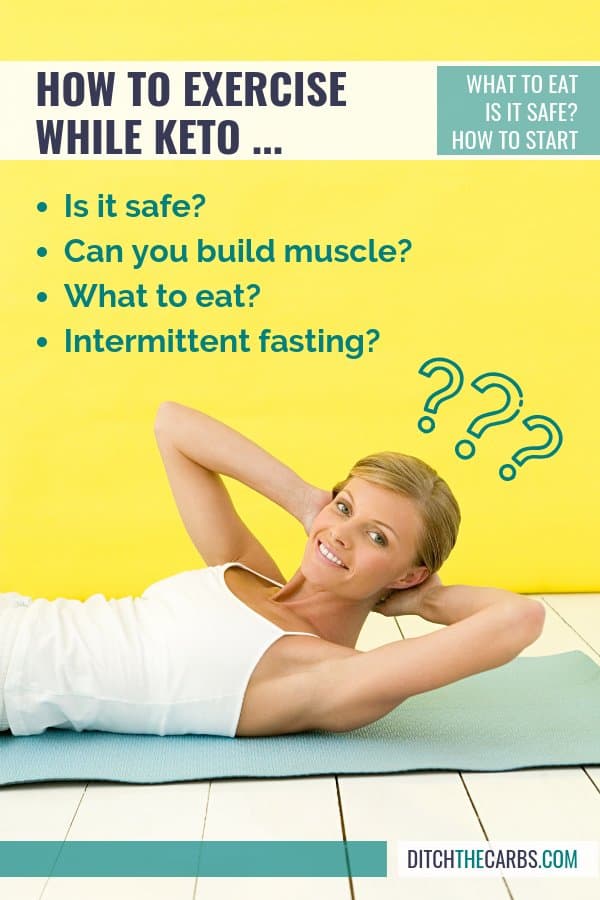
How To Be A Ketogenic Athlete is an article was written by Raphi Sirtoli, MSC and reviewed by Libby Jenkinson, MPS
This is an expert guest article from Raphael Sirtoli who has an MSc in Molecular Biology and is currently pursuing a Ph.D. in Health Sciences. His day job, however, is neuroscience research at the Behavioral n’ Molecular Lab. Raphael Sirtoli is also the co-founder of Nutrita, a website, and mobile app helping people grasp cutting-edge nutrition science, follow well-formulated low-carb diets, as well as reach their health and performance goals.
How to fuel keto workouts
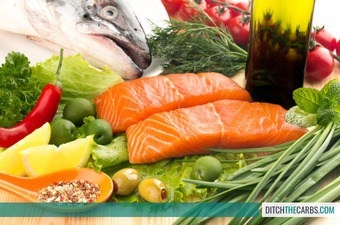
The ketogenic diet has become really popular these past 5 years.
Are you ready to lose weight and heal your body for life (without dieting, drugs, or making yourself miserable)?

Our free on-demand video training will walk you through how to make this THE year you set health goals…and keep them.
More and more people are giving the ketogenic diet a try. It’s vital for those who stick with it to make sure it fits with other important aspects of their life – like working out.
People who start any new diet may already work out or are likely to start. So it really does matter whether you can still work out well when living the keto lifestyle. Thankfully, enough science has surfaced to suggest you’ll be just fine. This doesn’t mean the ketogenic diet is optimal for everyone or should be everyone’s first choice, but it’s certainly a fabulous option to try out.
Ketogenic Athlete – Relying more on fat, less on glucose.
The main difference between exercising whilst in nutritional ketosis versus out of ketosis is how much you’ll be able to rely on fat versus glucose to fuel the effort. The more fat-adapted you are, the more you’ll rely on fat for fuel. This is true for all exercise intensities, even during high-intensity efforts where glucose use predominates.
Interestingly, what explains the performance difference between well-trained runners and recreational ones is not their ability to use glucose but their ability to burn fat – the more the better [1].
What does exercise do to ketone levels?
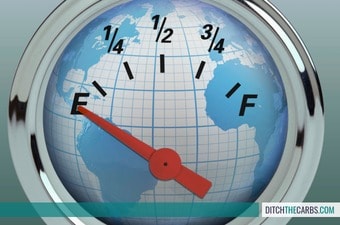
LOWER INTENSITY endurance activity INCREASES ketone levels
If you’re on a ketogenic diet and you start exercising at a low to moderate intensity, your blood ketone levels will increase and your blood glucose levels will decrease.
This is because you’re demanding even more fat from your fat stores to fuel your activity, some of this fat gets turned into ketones.
That happens when you rely on large enough amounts of fat. Indeed, elite endurance runners eating a ketogenic diet burned 2.3 times more fat than their high-carb counterparts during the peak fat-burning stage [2].
HIGH-INTENSITY activity momentarily DECREASES ketone levels
Say you ramp up the intensity to around 75% or more, what then? Your ketone levels will drop and your blood sugar will increase. This is normal and temporary.
You’re demanding more energy from your body at a faster rate, and since glucose ‘burns faster’ than fat, you start using a higher proportion of fuel from glucose. Although you rely proportionally less on fat at high intensities, you’re still be burning more fat overall because your total energy needs went up.
What are the benefits of keto diets for athletes?
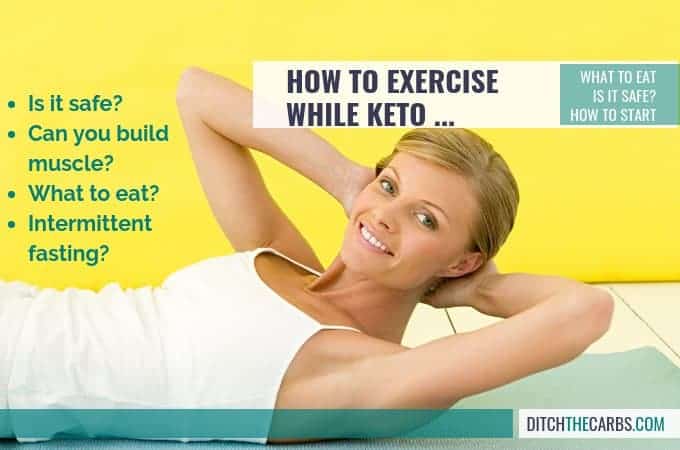
There are several benefits to consuming a ketogenic diet for athletes. Here are four important ones:
1: Ketogenic Athletes – Stable Energy Delivery
Keto diets allow people to rely more on fat for fuel rather than fast-acting glucose, especially during lower to moderate intensity efforts. Since fat is our most abundant and efficient fuel source, this allows keto athletes to exercise longer and with stable energy levels.
2: Ketogenic Athletes – Glycogen Sparing
A further benefit of increased fat burning is the ability to spare glycogen. By sparing glycogen – the storage form of glucose found in muscles and the liver – more of it is available for high-intensity efforts where it’s truly needed.
3: Ketogenic Athletes – Improved Recovery From Lower Chronic Inflammation
Well-formulated ketogenic diet greatly reduced chronic inflammation, a major factor impeding proper recovery after an exercise bout. These ketogenic diets can thus promote better recovery due to their anti-inflammatory properties [3].
An easy way to do this is to select foods that are both nutrient dense, have a low insulin index, and that you enjoy. Don’t worry, there are many!
4: Ketogenic Athlete – Normalizes Appetite
Additionally, ketogenic diets are renowned for their ability to normalize appetite (i.e. lessen cravings) [4].
Why is this important for athletes? A properly functioning appetite will allow athletes to eat the right amount of food, at the right time, and more importantly not be tempted by junk-food which will hinder their efforts.
Working out may increase hunger, which can potentially lead athletes who already eat poorly to eat even more junk! (when on a high carb diet).
Can you build muscle on keto diets?
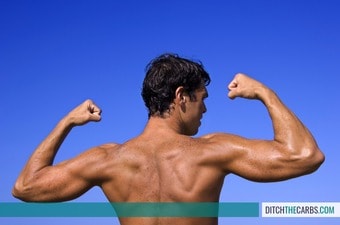
Yes [5,6,7]! And more specifically, ketogenic diets can improve body composition which usually happens by losing body fat without losing (and maybe even gaining) some muscle mass [8].
Building muscle requires many things, all of which you can get on a well-formulated ketogenic diet. The simple version is as follows.
Workout
You need to put your muscles under progressively higher loads, daily or at least three to five times a week; follow a progressive resistance training program.
Free-weights are great. Alternatively, try gymnastics, resistance bands, and online programmes or apps you can follow on your phone. One great example is Christopher Sommer’s online Gymnastic Bodies Program [9].
Eat right
Eat enough, especially lots of high-quality (animal) foods. Why is that?
Packing on muscle is costly and requires giving your body the right conditions for doing so (anabolic signals). So if you’re not eating enough for whatever reason, your body won’t spend its limited resources towards building a lean muscular physique (a luxury). More vital processes will be prioritized instead.
Your muscles need the right mix of ‘building blocks’. It comes down to eating a complete range of amino acids in the proper ratios and amounts. It’s actually pretty simple if you just eat lots of animal-sourced foods like fish, meat, eggs, shellfish and dairy.
Plant foods alone are not adequate for building muscle. They either entirely lack or have insufficient amounts of essential amino acids, such as methionine or tryptophan, to sustain healthy physiology and especially muscle hypertrophy.
A generous intake of animal fat is also important. These fats are precursors for steroid hormones used to build new cells. They also help you absorb many micronutrients crucial for building muscle. They also help you avoid chronic inflammation that causes muscle wasting [10]. It’s crucial to avoid inflammatory high-omega 6 seed oils like the plague [11]!
Sleep well
Sleep is where the bulk of recovery happens yet it’s often the first thing people cut down on when prioritising one’s busy life schedule.
It’s no surprise professional basketballers are known for sleeping 10 to 12 hours after a game or hard training session [12].
The science of sleep is still quite mysterious, but there are things we know to do (or not do).
- Aim for a good 8 hours starting before midnight
- Keep a consistent sleep schedule
- Avoiding things that disrupt sleep quality (and maybe duration), like alcohol or late-night meals
- Avoid blaring screens (blue-light) once the sunset and get sunlight ASAP after waking
Proper sleep is a major regulator of circadian rhythms, our bodies internal clocks orchestrating all of our life-giving and muscle-building functions carried out by our cells [13].
Not sleeping enough or sleeping poorly signals to your body that something isn’t quite right. This wouldn’t be the right time to divert resources towards costly processes like muscle building.
What are the downsides of keto diets for athletes?

Getting through the first few weeks of a ketogenic diet can be difficult, as nearly everyone will experience withdrawal symptoms from cutting out sugar and flour products. Your body also has to learn to fuel itself with more fat at the expense of carbs. This initial ‘adaptation phase’ is known as the keto-flu. [Read here How To Avoid The Keto Flu]
Be patient, it might take a while to get performance back to baseline
The basic physiological adaptation is actually relatively quick, taking only a couple days [14]. However, getting one’s athletic performance back to baseline or superseding it can take longer.
Studies are lacking to tell us how long, but anecdotal a few weeks to multiple months. This is a significant downside for athletes who have professional obligations and are constrained by their season.
This is why they would do well to make this significant dietary change in the off-season.
The ketogenic diet was assumed to be inadequate for endurance sports under the old carb-loading paradigm of the 1980s. This turns out to be incorrect.
A big reason why is the studies were poorly designed, not granting athletes sufficient time to keto-adapt. There are now better-designed studies suggesting ketogenic diets are not only adequate but might even be superior to classical high-carbohydrate diets for endurance sports [15].
We don’t yet know if keto is as good (or better) for high-intensity activity
As for high-intensity sports, like soccer or Crossfit, the ketogenic diet was and still is assumed to be inadequate by most researchers.
However, emerging evidence again suggests that ketogenic diets may also be adequate for high-intensity sports [16,17]! In truth, however, it remains an open question. People should thus keep an open mind and test the diet on themselves.
Make sure you don’t undereat when exercising on keto
The ketogenic diet is very satiating. This is not a problem per se, but some people may not be eating enough to sustain their performance. They may thus mistakenly blame the diet when in fact the problem is that they’re not eating enough.
Adding in a handful of berries, or high-fat dairy can help them eat a little more without being kicked out of ketosis. Alternatively, this may not be necessary as simply waiting for a little will normalize the appetite.
Keto may increase LDL cholesterol in some people
Lastly, people who are already quite lean and athletic can see their blood LDL-c cholesterol concentration rise on the ketogenic diet despite most or all other markers generally improving [18]. These people have been termed Lean Mass Hyper Responders (LMHR), coined by engineer Dave Feldman of CholesterolCode who first popularized the observation.
An increase in LDL-c cholesterol is not bad per se – although many doctors will worry about it – but the significance of this rise is currently unknown. The worry is understandable given the old dogma that cholesterol is bad and it causes heart disease, despite this hypothesis being thoroughly refuted [19,20].
Is it safe to exercise when on a keto diet?

It is safe to exercise/workout on a ketogenic diet. The state of nutritional ketosis is a natural metabolic state your body has evolved to function in. Humans are particularly ‘good’ at ketogenesis (the production of ketones) compared to all other animals.
Make sure your doctors adjust medications dosages on keto
However, just because the diet is inherently safe doesn’t mean that it prevents all potential issues. For example, the ketogenic diet powerfully lowers the blood sugars and blood pressure in people with elevated blood sugars or blood pressure [21]. And working out naturally causes (temporary) swings in blood sugar and blood pressure.
Consequently, people new to the ketogenic diet, and especially those who are working out, should consult their doctor for the following reason:
Many people are on medications for lowering blood sugar or blood pressure and they should make sure their doctor is aware of their new lifestyle changes so that medication doses can be adjusted accordingly
This would also apply to someone not on a ketogenic diet but who is doing intermittent fasting. This is because intermittent fasting also powerfully lowers insulin, blood glucose and blood pressure.
Can you workout while intermittent fasting?

Absolutely [22]!
Intermittent fasting is really just a fancy new term for something humans have naturally done for literally hundreds of thousands of years. The “Breakfast-Lunch-Dinner + snacks” paradigm is a modern invention with no scientific basis. It arose out of a nutrient-poor agricultural diet of grains and sugar, as well as the marketing of cereals and sports bars by manufacturers.
Intermittent fasting is great to maximize benefits from exercise
Humans evolved a different strategy than ruminants (e.g. cows or sheep) who graze continuously throughout the day to obtain sufficient nutrition from their low-calorie, nutrient poor food.
Humans are apex predators who successfully hunted high-calorie nutrient dense prey (e.g. woolly mammoths). Humans only need to eat about twice a day, on average.
This is hard on a nutrient-poor diet but quite natural on a well-formulated one that eliminates sugar, flour and seed oils.
Intermittent fasting isn’t appropriate for most world-class competitors
An elite athlete such as a Tour de France cyclist will need to eat more than twice a day to sustain their incredibly high work output. The vast majority amateur athletes like you and me will do fine on an average of 2 meals a day.
More importantly, it will help you maintain metabolic flexibility; your body’s ability to fuel with fat and glucose to grant you endurance and explosive power. Just to clarify, this doesn’t happen by eating a keto diet some days and then a high-carb diet on others.
It happens by:
- not eating too often during the day (no snacking)
- eating nutrient-dense foods that don’t require you to secrete too much insulin
- doing high-intensity workouts every so often (a handful of times a week or month)
Keto compliant pre-workout supplements

Caffeine and creatine are probably the safest, most tested, efficacious and widely available pre-workout supplements [23,24]. They can be taken together, although it’s unclear if it’s better to take them together or to take creatine on training days and then caffeine alone on ‘game day’ [25,26,27].
Homemade electrolyte supplementation
Interestingly, creatine can also be combined with electrolytes to achieve a performance benefit [28]. An electrolyte supplement can be a home-made with
- A few grams of plain old table salt (NaCl)
- Between 100 and 300 milligrams of magnesium (Mg)
- Between 50 and 150 milligrams of potassium (K)
Pre-made electrolyte supplementation
However, for convenience, you may prefer to buy a ready-made product like LMNT recharge, a pre-workout supplement concocted by Robb Wolf and Luis Villasenor. I recommend it because it’s simple, safe and effective. This product is specifically targeted for low-carbers and especially people on ketogenic diets.
Electrolyte supplementation is particularly important when starting a ketogenic diet and working out.
Conclusion
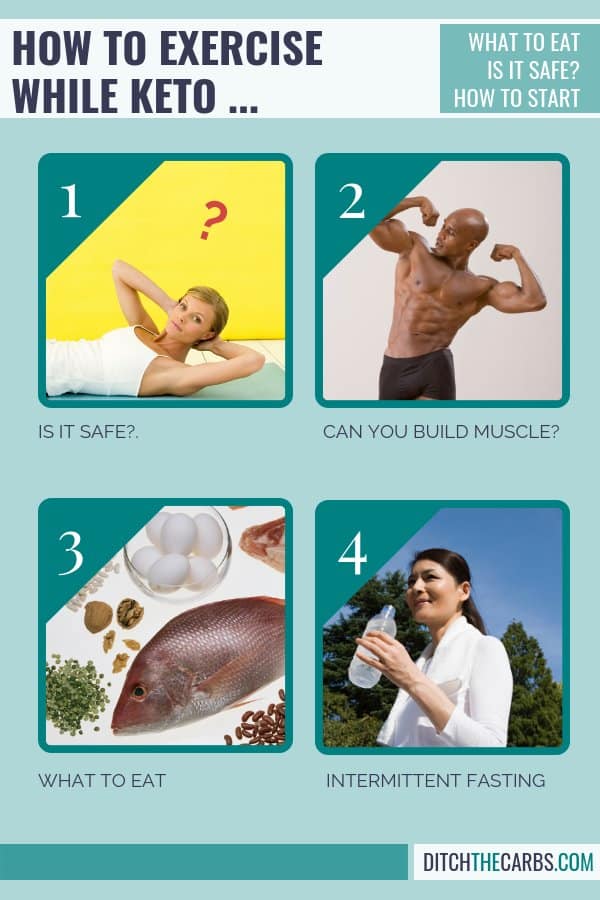
In summary, a well-formulated ketogenic is totally compatible with athletic efforts.
For elite athletes, a keto diet is also an option, but there are more uncertainties; is the ketogenic diet optimal? What kind of athletic efforts are most likely to lend themselves to a ketogenic metabolism?
Most people have some degree of chronic inflammation and fat to lose, both of which make the ketogenic diet a great option.
Make sure you supplement with electrolytes when starting the diet if you feel the keto-flu coming on (especially if working out). And most importantly, exclude flour products, sugar and seed oils to make your ketogenic diet healthy.
What if you could actually take control of
your health in just 10 days?
It’s not your fault you can’t lose weight as a woman over 40 even though you’ve likely tried literally everything. Your metabolism probably feels broken and your hormones are likely all out of whack.
But you can fix it all with ONE simple change: eliminate sugar. We make it super easy with daily lessons teaching you the science behind what makes us gain weight in our midlife and beyond! Are you ready to get started now?


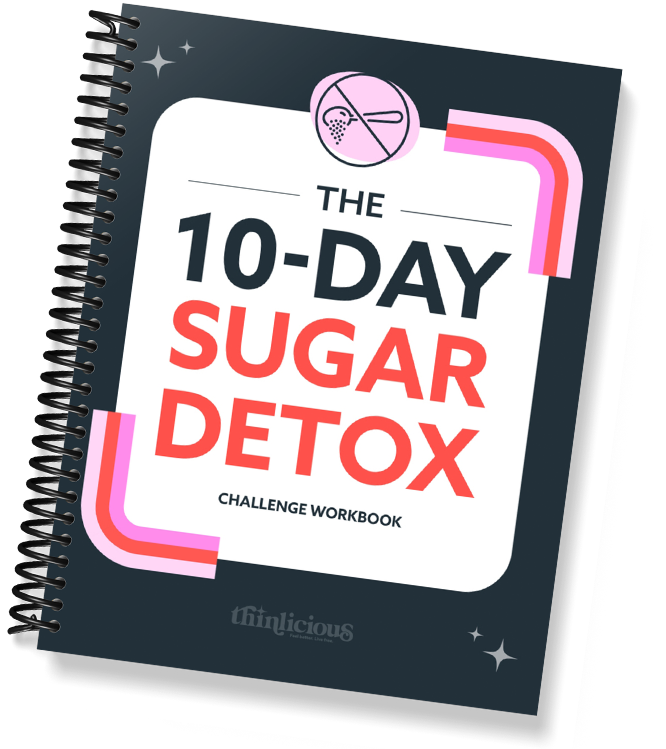






Building muscle and losing fat at the same time while on keto is a fact!!! I started a strict ketogenic diet on januari 1 this year. I lost almost 30 pounds of fat while gaining 12 pounds of muscle mass in just 5 months time. And I am a 59 year old man!!! Keto is the way to go, without any doubt!
I’ve done Keto diet before and it works really well, but my performance on the hockey pitch during matches takes a nose dive. I have no energy and lack my usual speed. What would I add to my diet on the days of matches to give me my usual performance please? Would I be ok to add a banana to a smoothie with chia , hemp and flax seed & peanut butter with almond milk? This would be my breakfast a few hours before my match. And only once a week? I burn up to 800 active calories in a match.
Try fueling your high intensity athletic activities with MCT Oil 30 – 45 minutes prior to the event.
MCT Oil is derived from coconuts, and it is a type of fat that is sent directly to the liver for conversion into energy.
When I first started taking it, I started with one that was flavored, so I used to take it on an empty stomach, but over time I found that having something in your stomach prior to ingesting it, or to take unflavored MCT Oil blended into a protein shake works even better, as this prevents it from moving through your system too quickly on occasion, if taken by itself.
Most people are surprised at how much smooth, clean, long lasting energy they get from MCT Oil once they try it.
Start out with 1 tablespoon and see how that works for you (how much energy it gives you, how long the energy lasts, how you respond to it, how you feel after your body’s used it up, etc.) After you’ve taken it a couple of times and see what it does for you, you can try taking 2 tablespoons, if you’d like, to see if that works better for you, or if 1 tablespoon is enough.
I’ve found that for longer events, it’s best to take it once before the start of the event, then another serving after about 2 hours or so. This seems to works better than trying to just take a large dose at the start of the event.
I am a 50 year old woman who has always exercised but have put on a lot of weight in the past 5-6 years. I am now 170.
I have been doing the keto diet religiously for 6 weeks now. I have been managing between 1200-1500 calories per day and have been aiming to maintain a 60% fat, 25-30% protein and 10-15% carbohydrates.
I do occasionally drink vodka with seltzer on a weekend.
I work out 6-7 days per week and have been doing a mbfa muscle burns fat Beachbody program, I am almost done with that program. I also do kickboxing, cycling and a lot of walking to up the ante and Ensure I reach or exceed 10,000 steps per day.
The issue? I have only lost 4 pounds…and I have only been in ketosis twice according to the pee test strips.
While I have always worked out, I ate shamelessly the things I loved such as potato chips and red and white wine. I have likely halved my caloric intake and doubled my workout intensity.
Why so little result?????
I am feeling very depressed as a result….